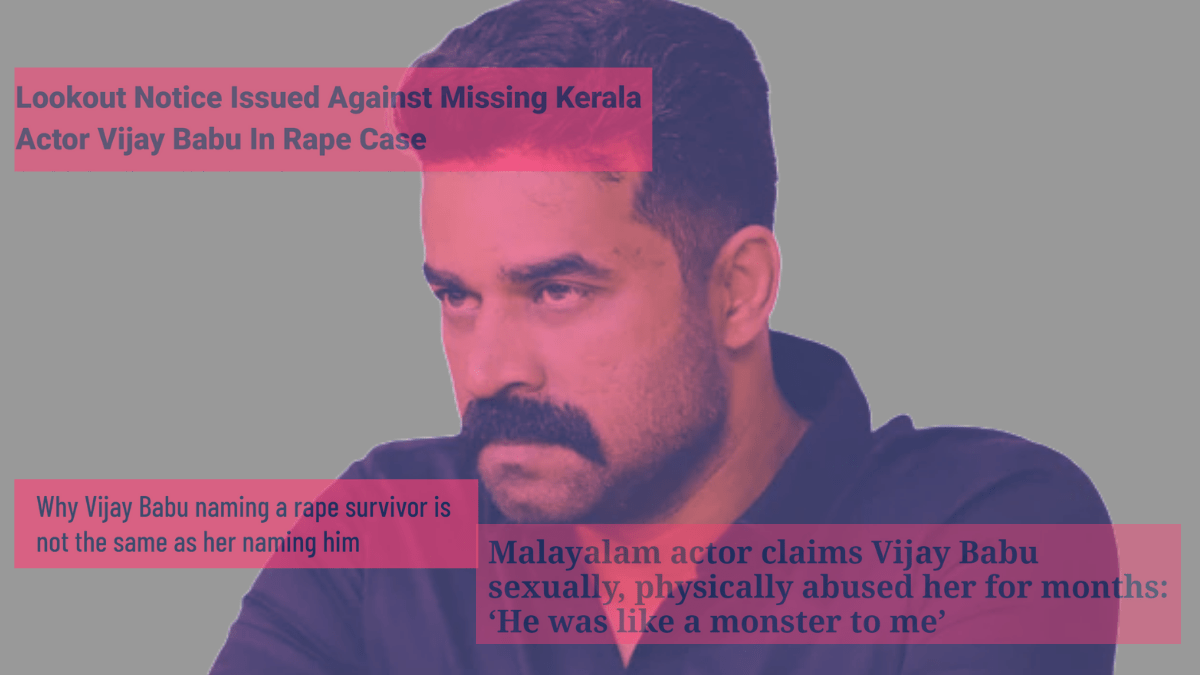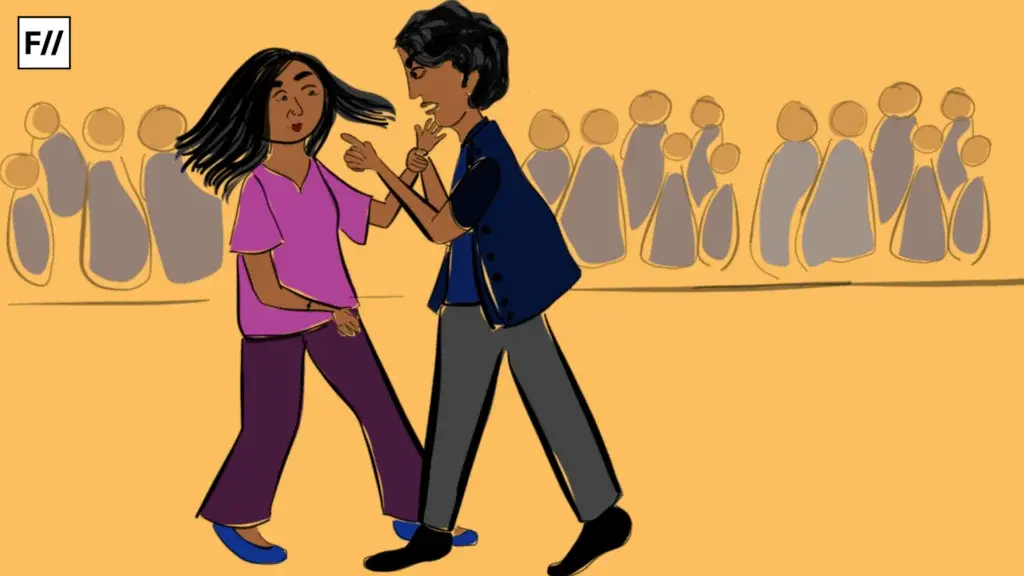On April 26, Tuesday night, rape accused film producer and actor Vijay Babu went LIVE on Facebook to bemoan the severity of getting MeToo-ed that he refers to as something one can truly understand ’only when it happens to oneself’. He centres on the pain it causes to the sexual predators who are getting called out. The blatant absence of remorse on his face as he smirks while opening the monologue might have been only disturbing for many women to witness. What’s even more distressing is that many of us have known several Vijay Babus in our lifetimes. Vijay Babus are among the sexual predators we hesitate to call out because we know with certainty that it won’t be followed by a willingness to listen, accountability, self-reflection nor a faint expression of remorse. We know that MeToo-ing the Vijay Babus would be undoubtedly followed by a storm of denial, gas lighting, self-victimisation, further harassment, empty threats and dramatic sobbing. We know that we’d be further bullied, isolated, demonised, silenced and punished.
The survivor who reported Vijay Babu has proven to us that it is worth coming forward, no matter how obnoxiously a Vijay Babu whines and shouts. She proved to us that there’s power in standing by one’s truth and there would still be people believing us. She reminds us that we are not alone. She has not allowed the shame and trauma to keep her silent.
Also read: The Contributions Of The #MeToo Movement To The Discourse On Sexual Violence
In the past months, MeToo Kerala caught a momentum like never before in history. Survivors have been declaring their truth to the world, telling each other, ‘you are not alone’. A fiercely protective sisterhood is coming together, empowering each other with empathy. Tarana Burke, the Black woman from Bronx who first used the hashtag MeToo, refers to the movement as “the start of a larger conversation and a movement for radical community healing” as she calls upon survivors and allies to join in. From the Reddit post that MeToo-ed Sujeesh PS to Kunjila Mascillamani writing a searing response to actor Vinayakan, MeToo Kerala has already compelled many survivors to discover that they weren’t alone. It’s making women trust each other with their pain. Secrets that were weighing women down became powerful testimonials, motivating more testimonials. Strangers became sisters. Possibilities for healing opened up.
From the Reddit post that MeToo-ed Sujeesh PS to Kunjila Mascillamani writing a searing response to actor Vinayakan, MeToo Kerala has already compelled many survivors to discover that they weren’t alone. It’s making women trust each other with their pain. Secrets that were weighing women down became powerful testimonials, motivating more testimonials. Strangers became sisters. Possibilities for healing opened up.
Vijay Babu appeals to the men who’re feeling victimised by the MeToo movement
The Vijay Babus vehemently distort our truth because they feel confident they can count on the empathy and loyalty of thousands. They feel protected and enabled by each other, feeding on the society’s cynicism that hesitates to believe survivors. He repeatedly expressed discontent in the survivor being ‘protected’ by law. He insists that the survivor must not be seen as a victim given this court is yet to rule on her accusation. Believing the reality of a survivor doesn’t need to wait until the survivor gets through the ordeal of the possibly re-traumatising process of a legal battle and the perpetrator’s conviction. The experience of sexual violence is already unfortunate.
Gaslighting the public with the mention of screenshots
In the video he also announces his willingness to publish 400 screenshots as if the online exchanges can prove his innocence, as if he was accused of cyber bullying. Why does Vijay Babu pretend like he was accused of cyber-bullying? What else can he disprove with 400 screenshots of an online conversation?
Vijay Babu knows that what the survivor accused him of isn’t cyberbullying and therefore, publishing any number of screenshots cannot prove his innocence. Vijay Babu knows that threatening to publicise private conversations will not vindicate him from charges of sexual assault nor criminal intimidation but he is confident it would distract the public attention. Vijay Babu knows that there would be enough Vijay Babus in the world craving the voyeuristic pleasure of reading text messages of a woman in pain, eager to discredit her as hysterical.
The sexual predator’s guide to drumming up collective victimhood
We remember Brett Kavanaugh’s tearful opening statement in which he mentioned his daughters multiple times. His voice breaks and pauses for gasps while recalling, “the other night Ashley (wife) and my daughter Liza said their prayers…and little Liza, all ten years old said to Ashley we should pray for the woman”.
Vijay Babu has many self-victimising sexual predators’ manipulative responses to take notes from and he seems to have done his homework. However, the manipulative extension of victimhood to the women in his life appallingly undermines the intelligence of the general public. He mentions how his concern is mainly about the pain endured by “ente kutty, enta amma, ente bhaarya, ente pengal, ente friends, enne snehikkunnavar” (translation: “my child, my mother, my wife, my sister, my friends, the people who love me”). He repeats this phrase three times in the span of eight minutes and one second. It doesn’t conceal the attempt to line up a pity-inducing imagery of an innocent child, a frail mother, a delicate wife, concerned friends and all the aching hearts in his life who are impacted by the ‘action’ of the survivor; the action of the survivor being reporting him for sexually assaulting her.
It is also interesting how Vijay Babu didn’t include his brother on the list. He was also careful to refer to his son with a gender-neutral term. Adding “Ente Sahodaran, ente makan” (translation: my brother, my son) doesn’t elicit as much sympathy, given they do not sound as weak according to a misogynistic dictionary. Benevolent sexism limits men’s accountability to the women who serve certain roles in their lives. Vijay Babu appeals to the society’s soft corner for a family man.
Also read: Carnatic Music’s #MeToo: How Media Defeated The Cause By Enabling The Artistes
Revealing the name of the survivor is an attempt to silence all survivors
Although his attempt to intimidate the survivor into silence comes from a place of angst, it signals a cautionary tale to survivors who are yet to speak up. He’s announcing how speaking up provokes further violence. With a feigned self-assuredness, Vijay Babu makes it noteworthy that he doesn’t fear consequences.
The predator revealing the identity of a survivor is violence. What must enrage us isn’t just the ‘illegality’ of disclosing a survivor’s identity but the callousness of a sexual predator doing it. Although his attempt to intimidate the survivor into silence comes from a place of angst, it signals a cautionary tale to survivors who are yet to speak up. He’s announcing how speaking up provokes further violence. With a feigned self-assuredness, Vijay Babu makes it noteworthy that he doesn’t fear consequences. What message does this send to the survivors who are assessing what it would be like to report sexual assault? Referring to a sexual predator as ‘the accused’ signals a society’s denial to believe the survivor until validated by the court of law, an institution with the kind of conscience that doesn’t even consider marital rape a punishable offense.
The escalating angst of squirming predators like Vijay Babu is only a sign that change is coming. MeToo Kerala isn’t bowing down. The movement blazes on.




